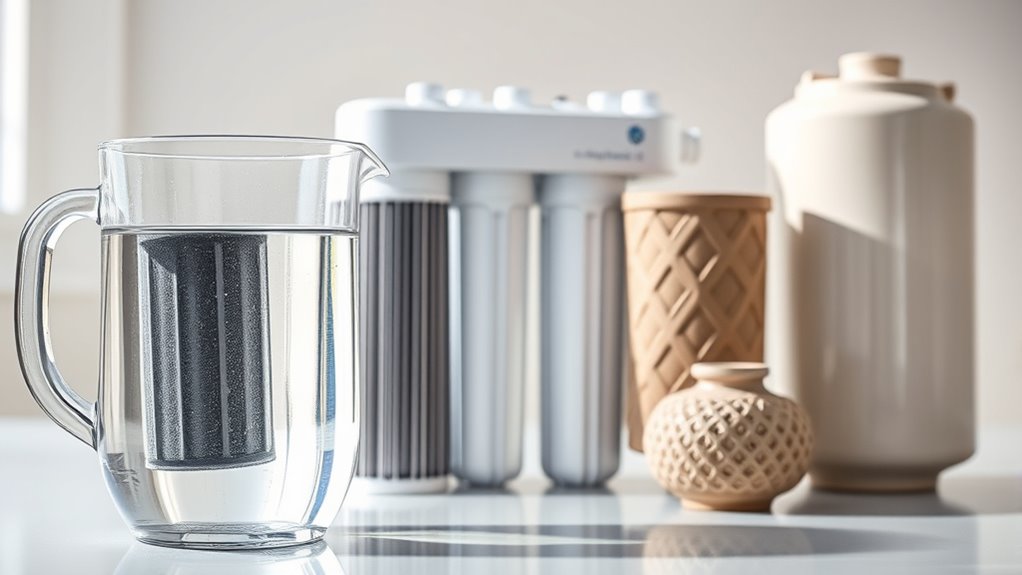Understanding water filter types helps you choose the best for your home. Pitcher and countertop filters are great for daily use and simple replacement, while under-sink systems connect directly to plumbing and save space. Whole-house filters provide clean water for every tap, and reverse osmosis units remove a broad range of contaminants with regular maintenance. Portable and specialty filters suit on-the-go needs. Keep exploring to discover which solution fits your household perfectly.
Key Takeaways
- Pitcher and countertop filters are easy to use and require regular filter replacements for fresh, great-tasting water.
- Under-sink systems connect directly to plumbing, saving space and providing continuous filtered water with proper maintenance.
- Whole-house filters ensure every tap delivers clean, great-tasting water by removing contaminants like chlorine and lead.
- Reverse osmosis systems use membranes and UV sterilization to effectively eliminate a wide range of pollutants for high-quality water.
- Portable and specialty filters are ideal for on-the-go use, offering quick, easy filtration for travel, camping, or targeted needs.
Pitcher and Countertop Water Filters
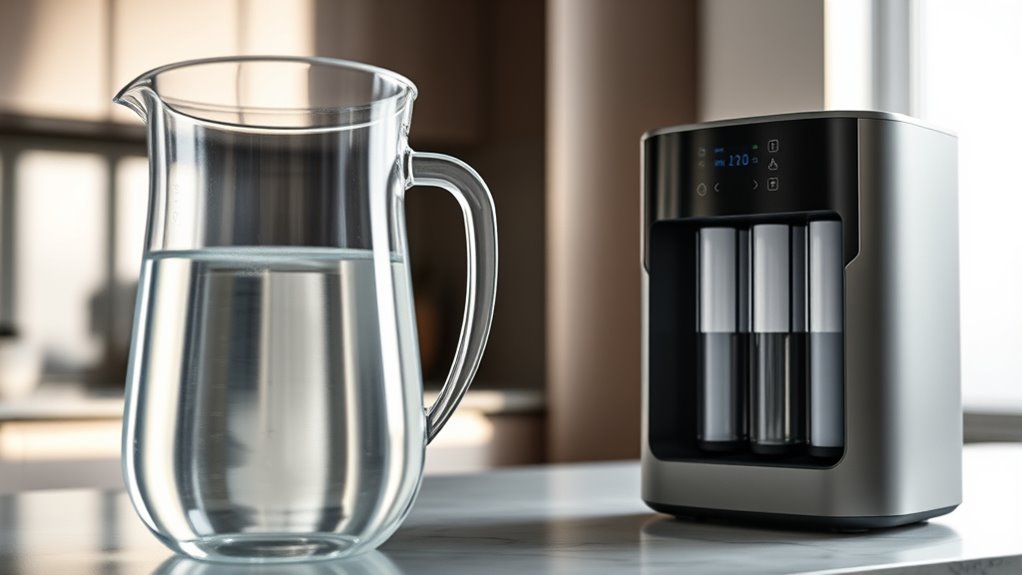
Pitcher and countertop water filters are convenient options for improving your drinking water straight from the tap. They usually feature a specific filter capacity, which determines how much water you can purify before needing a filter replacement. Many models are designed to handle daily use, making them ideal for families or individuals who want quick, easy access to clean water. When selecting a filter, consider its capacity to ensure it meets your household’s needs. Keep in mind that regular filter replacement is essential to maintain water quality and prevent buildup of contaminants. Most filters are straightforward to replace, often involving simple removal and insertion. Staying on top of filter replacement schedules guarantees your pitcher or countertop system keeps delivering fresh, great-tasting water.
Under-Sink Water Filtration Systems

Under-sink water filtration systems offer a sleek and efficient way to enjoy clean, great-tasting water directly from your tap. Installation requirements are straightforward but do involve connecting the filter to your existing plumbing, which may require some basic tools and plumbing knowledge. Once installed, these systems typically need minimal space and provide a continuous supply of filtered water. Proper maintenance and correct installation are essential to ensure long-lasting, reliable performance, especially since neglecting filter changes can lead to reduced flow rates and compromised taste. Despite these challenges, under-sink systems are a convenient, space-saving choice for those wanting high-quality water straight from the tap without cluttering counter space. Regular filter replacement is vital for maintaining optimal water quality, and understanding filter lifespan can help you plan timely maintenance.
Whole-House Water Filtration Solutions
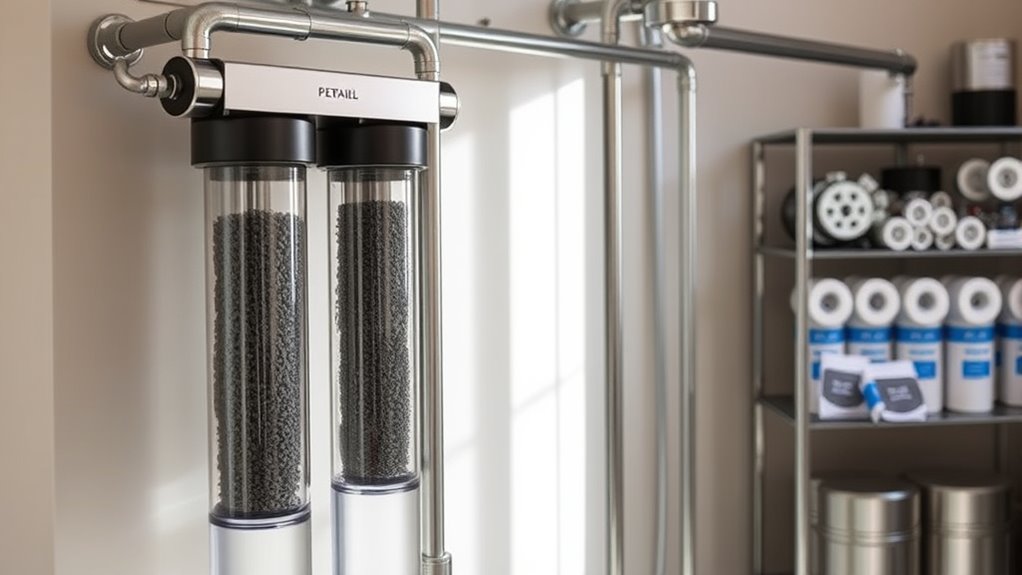
Whole-house water filtration solutions provide exhaustive clean water for your entire home, ensuring every tap delivers high-quality, safe, and great-tasting water. These systems are essential for maintaining urban water safety, especially when municipal supplies may contain contaminants. Regular water quality testing helps identify pollutants like chlorine, lead, or sediments, guiding your filtration choices. By installing a whole-house filter, you can:
- Remove harmful chemicals and sediments before water reaches your appliances and fixtures
- Improve the overall taste and clarity of every drop
- Protect your family’s health by reducing exposure to pollutants
- Understanding water quality testing helps you choose the right system tailored to your needs
This comprehensive approach saves you time and effort, providing peace of mind knowing your home’s water is consistently safe and clean. It’s a smart investment in your health and home durability.
Reverse Osmosis Systems Explained
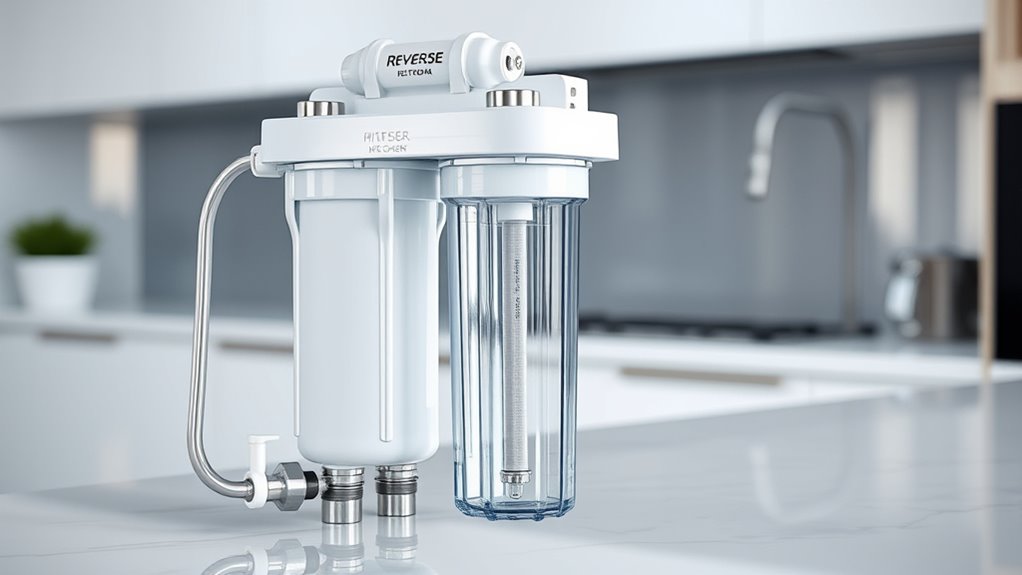
Reverse osmosis systems are highly effective water filtration units that remove a wide range of contaminants through a semi-permeable membrane. They markedly improve water quality by eliminating dissolved solids, heavy metals, and bacteria. To guarantee purity, many systems include UV sterilization, which kills bacteria and viruses that may bypass the membrane. Chemical filtration stages, such as activated carbon filters, also play a vital role by removing chlorine, pesticides, and organic compounds that can affect taste and safety. These advanced features work together to deliver clean, fresh water straight to your tap. Regular maintenance is indispensable to keep all components functioning effectively, especially since proper upkeep ensures the longevity of the filtration system. Whether for drinking or cooking, a reverse osmosis system offers a reliable solution for high-quality water.
Specialty and Portable Water Filters
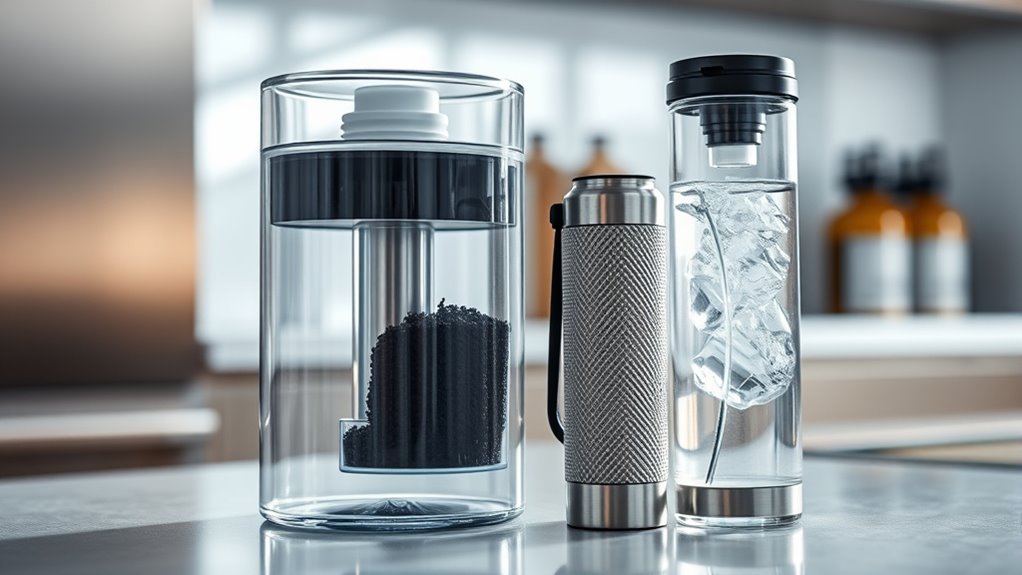
While reverse osmosis systems excel at providing all-encompassing filtration, there are situations where specialized and portable filters are more practical. These filters are perfect for on-the-go use or targeted needs, such as pH balancing or mineral enhancement. Portable options include water bottles with built-in filters, countertop units, and under-sink systems that are easy to install. They often use activated carbon or mineral cartridges to improve taste and add essential minerals, ensuring your water maintains a healthy pH level.
Consider these benefits:
- Compact design for travel or camping
- Customizable mineral and pH adjustments
- Easy maintenance and replacement filters
Frequently Asked Questions
How Often Should I Replace the Filter in My Water Filter System?
You should replace your water filter according to the recommended maintenance schedule, typically every 6 to 12 months. Check your filter’s user manual for specific guidance, as factors like water quality and usage can affect timing. Regular filter replacement guarantees clean water and peak system performance. Don’t forget to monitor for signs of wear or reduced flow, which indicate it’s time for filter replacement.
Can Water Filters Remove All Types of Contaminants From Tap Water?
Think of water filters like a net—great for catching many things but not everything. They can remove common contaminants like chlorine, lead, and sediment, but their scope is limited by filter type and design. Some filters can’t eliminate chemicals, viruses, or dissolved minerals. So, don’t rely on a single filter for all contaminant types; understanding their limitations guarantees you get the safest water possible.
Are Water Filters Effective Against Viruses and Bacteria?
Water filters can be effective against viruses and bacteria if they have high filtration efficiency and are specifically designed for virus removal. Look for filters with pore sizes small enough to block microorganisms, such as ultrafiltration or reverse osmosis systems. Keep in mind, not all filters are equal, so check the product specifications to guarantee they target viruses and bacteria effectively. Proper maintenance also plays an essential role in their performance.
What Is the Typical Lifespan of Different Water Filtration Systems?
Did you know that most water filtration systems last between 6 months to 2 years? Filter longevity varies widely depending on the type—carbon filters typically last 6-12 months, while reverse osmosis systems can go 2-3 years. Regular system maintenance, like changing filters as recommended, guarantees your water stays clean and safe. Staying on top of these intervals helps you avoid costly repairs and ensures ideal filtration performance.
Do Water Filters Impact the Taste and Mineral Content of Water?
Yes, water filters can impact the taste and mineral content of your water. They often reduce minerals like calcium and magnesium, which may cause taste alteration, making water less crisp or metallic. Depending on the filter type, some minerals are retained while others are removed. If you prefer mineral-rich water, choose filters designed to preserve essential minerals; otherwise, expect some mineral reduction and a different taste profile.
Conclusion
Choosing the right water filter depends on your needs and lifestyle. Whether you opt for a simple pitcher, an under-sink system, or a whole-house solution, understanding your options helps you make smarter choices. Are you ready to enjoy cleaner, better-tasting water every day? Remember, the right filter not only protects your health but also enhances your home’s comfort. Take the time to find what suits you best—your water, and your well-being, deserve it.

